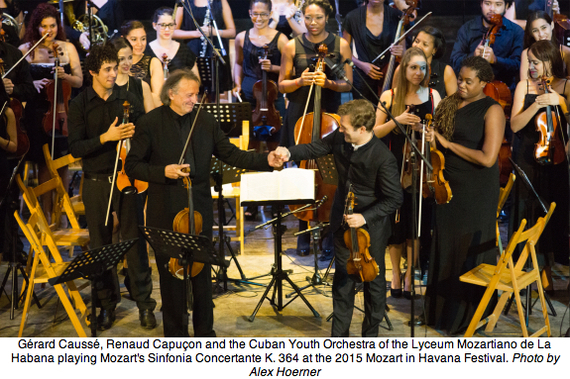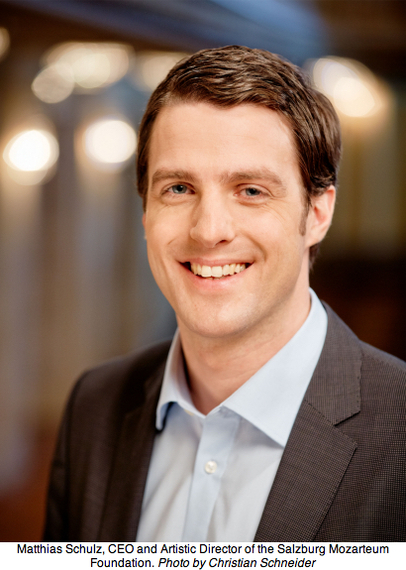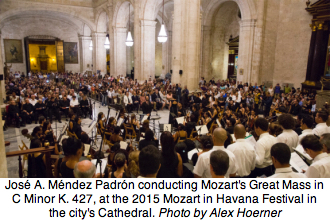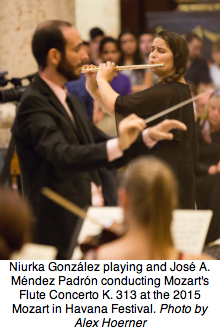Reflections on a Mozart Festival in Havana:
15 Minutes with Matthias Schulz, CEO and Artistic Director of the Salzburg Mozarteum Foundation
The opening night was a magic moment which nobody will ever forget: Mozart's Great Mass in C Minor being performed for the first time ever in Cuba! The singers were Claire Elizabeth Craig, a Salzburg trained soprano, and three young Cuban soloists. The cathedral was packed, the doors to the Plaza in front of the cathedral were open; the sound of Mozart's Mass, which has a special meaning for Salzburgians, mixed with the sounds of an island that never sleeps.
The opening concert of last month's nine-day Mozart in Havana Festival, October 16, took place in the Catedral de la Habana, where Pope Francis had presided three weeks earlier. It featured Mozart's Great Mass in C Minor K. 427, with international and Cuban soloists, and the Cuban Youth Orchestra of the Lyceum Mozartiano de La Habana orchestra school, which had played for Pope Francis during his visit. The concerts, master classes, film screenings, early music and chamber music that followed were presented in the Teatro Nacional, the Oratorio San Felipe Neri, which was built in 1786, five years before Mozart's death, the Universidad de las Artes ISA, and other sites and institutions around the city.
The performances of Mozart, and other composers, were played in formal and informal settings by top Cuban musicians and celebrated international stars. Violinist Renaud Capuςon, violist Gérard Caussé and cellist Clemens Hagen played Mozart's great Divertimento K. 563, followed the next morning by a public masterclass. For the Festival finale on October 24, the Cuban Youth Orchestra returned to perform Mozart's Symphonies 1 and 41, the "Jupiter."

The Festival, which was planned by the Lyceum's director Ulises Hernández, featured mainly Cuban musicians including flutist Niurka González, soprano Bárbara Llanes, pianist Frank Fernández and the all-woman Camerata Romeu string orchestra; the programs included music not only by Mozart, Schubert and Beethoven, but by Leo Brouwer, Ignacio Cervantes and Cayetano Pagueras.
The Festival was co-produced by the Salzburg Mozarteum Foundation, which had founded the Lyceum Mozartiano in 2009 at the initiative of its president Johannes Honsig-Erlenburg, the European Union and various Cuban governmental organizations and educational institutions. It celebrated the completion of the Lyceum's first six-year phase, and made an important statement of commitment to classical music in a country where young musicians still suffer from limited access to the classical music resources they need to develop their skills through education, training and experience.
The city of Salzburg itself participated in the project earlier in the year, when it invited the Cuban Youth Orchestra to play two concerts of Mozart and a Cuban-themed night during Salzburg Mozart Week in January 2015. Their appearance generated so much enthusiasm that a contingent of audience members accompanied the trip to Havana in October.
Also making the trip from Austria were massively-complicated shipments of bulky stage items like a height-adjustable platform for the Oratory of San Felipe Neri, the practice room and concert hall of the Lyceum Mozartiano; a large shell to improve the acoustics of the hall; two Sauter grand pianos designed specifically for tropical weather, and equipment for what is claimed to be "the largest mediateca (media library) in all South America."
I spoke to Matthias Schulz, CEO and Artistic Director of the Salzburg Mozarteum Foundation, about the Festival.
LV What was your favorite concert?
Matthias Schulz The opening night was a magic moment which nobody will ever forget: Mozart's Great Mass in C Minor being performed for the first time ever in Cuba! The singers were Claire Elizabeth Craig, a Salzburg trained soprano, and three young Cuban soloists. The cathedral was packed, the doors to the Plaza in front of the cathedral were open; the sound of Mozart's Mass, which has a special meaning for Salzburgians, mixed with the sounds of an island that never sleeps.
LV What impressed you most about the Cuban Youth Orchestra?
Matthias Schulz The quality of an orchestra depends on the natural talent of the musicians, the training they receive and sufficient experience. The talent and passion of the Cuban Musicians are simply fantastic, prerequisites for the fine results we heard-the technical training is being done to the highest standards. There is, however, still a lack of information regarding the broader spectrum of orchestral colors and how to use the sound ideals of historically informed, performance practice which are especially important in connection with Mozart.
LV How good were their instruments?
Matthias Schulz It is remarkable how well they perform, considering the mediocre quality of many of their instruments, which are difficult to keep in good working order under Cuba's intense tropical conditions.
They depend on the workshop of string instrument maker Andrés Martínez in Old Habana. His shop is called "Luthiers sans Frontières," and is also funded by the European Community. Martínez reports that he has repaired and maintained more than 450 string instruments during the past few years. In all regards relating to instruments, further support is needed.
LV How did the Cuban musicians respond to Mozart?
Matthias Schulz It was remarkable to see how the Cuban musicians, not just those from the Cuban Youth Orchestra, coped with the melancholy of the minor key slow movements in the Piano Concertos K. 271 and K. 488, and the Sinfonia Concertante K. 364. We may have learned much more from the Cubans than they learned from us. They showed us what the Lyceum Mozartiano project really needs: True enthusiasm, the huge courage to improvise, and a steady willingness to improve.
LV What is the "mediateca"?
Matthias Schulz In addition to advanced training for musicians, the Lyceum project has also focused on a media library intended for students and public that would improve unrestricted access to books and scores. We also combined experience and knowledge courses in orchestra and arts management so that the Lyceum could operate as a concert organizer and presenter.
LV What kind of support team did you have?
Matthias Schulz Our team was fantastic, young, focused and very reliable; everybody did his or her best to fulfill all expectations.
The Cubans can certainly learn a little from us about how to use time more efficiently, while we may eventually learn that it is a mistake to exaggerate and overrate small problems. Perhaps we need to learn how to improvise as an organization; it has always been a part of music, particularly Mozart's! And, although the concerts were well attended, with Cubans of all ages, some tourists and Europeans working in Cuba in our audiences, further aspects of advertising and public relations is something that Cubans may learn more about from us in Europe and the United States.
LV What does the future look like for the Lyceum Mozartiano?
Matthias Schulz The challenge of the future for the Lyceum Mozartiano will be to keep its current position and continue its development towards becoming an independent, active cultural institution. This Mozart Festival was the first but, as we all hope, not the last one to be held in Cuba. Because the Mozarteum Foundation has now let the Lyceum Mozartiano go, its permanent success will require further partners in Cuba and abroad, especially in Europe; we have already helped to connect the Lyceum Mozartiano with other cultural institutions and funding organizations and in all cases further support, cooperation and activities have grown.


